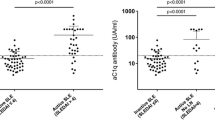Abstract
The aim of this study was to investigate the relationship between the presence and titre of antibodies against C1q (anti-C1q Ab) and disease activity and renal involvement in patients with systemic lupus erythematosus (SLE). Anti-C1q Ab were measured in 79 patients with SLE (70 women and 9 men; mean age 41.7 years; mean disease duration 8.4 years): 19 patients had active disease with lupus nephritis, 8 active disease without nephritis, 26 inactive disease with nephritis and 26 inactive disease without nephritis. Anti-dsDNA antibodies (EIA and immunofluorescence), antiendothelial cell antibodies (AECA) and complement levels (C3, C4, total haemolytic complement activity) were determined in parallel. Anti-C1q Ab were positive in 49%, anti-dsDNA Ab in 61% and AECA in 19% of the patients, respectively. Significantly higher titres of anti-C1q Ab were found in patients with active disease compared with those with inactive SLE (P < 0.01). Serum levels of anti-C1q Ab showed a positive correlation with anti-dsDNA Ab and SLEDAI score (P < 0.01) and a negative correlation with C3 (P < 0.05), C4 (P < 0.01) and CH50U (P < 0.01). The presence of anti-C1q Ab was not different between patients with or without nephritis. In patients with (P < 0.05) and without nephritis (P < 0.01) the frequency of anti-C1q Ab was significantly higher in active patients compared with inactive patients. Both anti-C1q and anti-ds-DNA Ab were detectable in 74% of patients with active nephritis but only in 30% of all other patients (P=0.001). None of the patients with active nephritis was negative for anti-C1q and anti-dsDNA Ab, whereas 37% of the patients without active nephritis were negative for both antibodies (P < 0.01). Sensitivity, specificity, positive and negative predictive values for active lupus nephritis among SLE patients were 100%, 50%, 51.9% and 100% for anti-dsDNA Ab (EIA) and 74%, 70%, 57% and 89.4% for positive findings of both anti-dsDNA and anti-C1q Ab. The presence and titre of anti-C1q-Ab in SLE are related to disease activity. Absence of anti-dsDNA Ab excludes active nephritis; positive findings of both anti-dsDNA Ab and anti-C1q Ab are of relatively high specificity for active nephritis.
Similar content being viewed by others
Author information
Authors and Affiliations
Corresponding author
Rights and permissions
About this article
Cite this article
Oelzner, P., Deliyska, B., Fünfstück, R. et al. Anti-C1q antibodies and antiendothelial cell antibodies in systemic lupus erythematosus – relationship with disease activity and renal involvement. Clin Rheumatol 22, 271–278 (2003). https://doi.org/10.1007/s10067-003-0724-3
Received:
Accepted:
Issue Date:
DOI: https://doi.org/10.1007/s10067-003-0724-3



